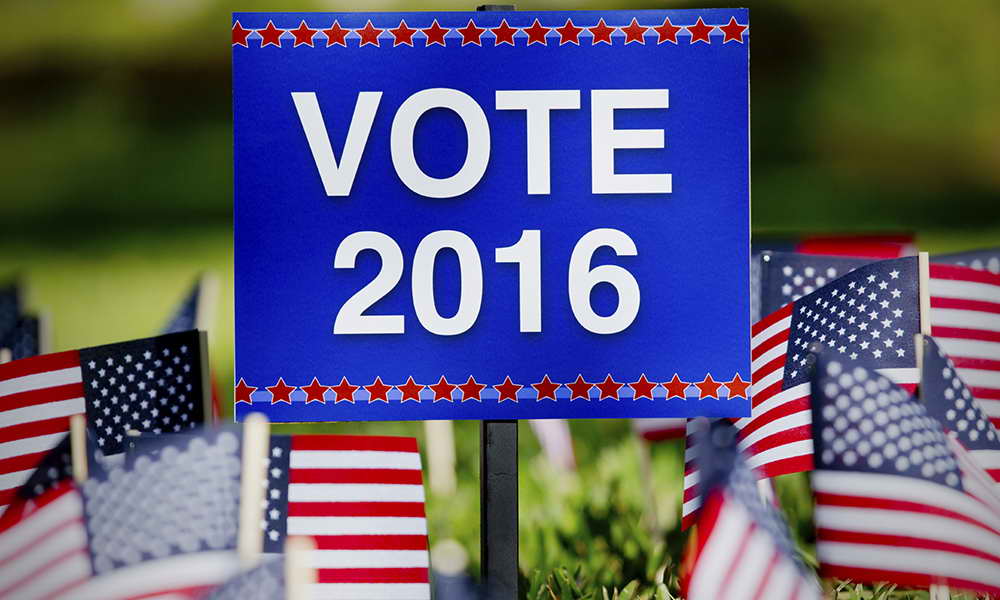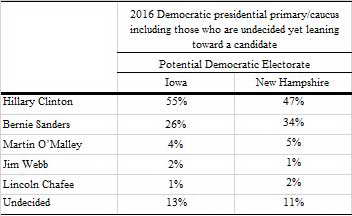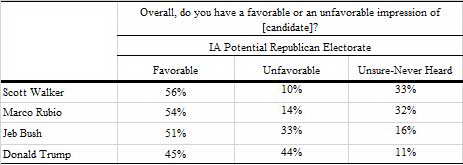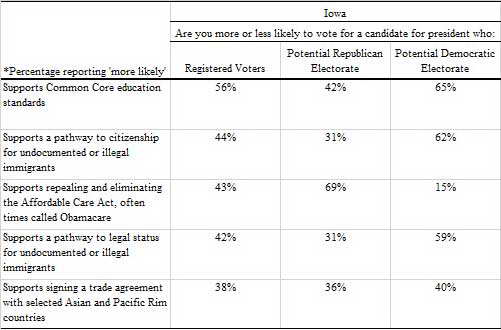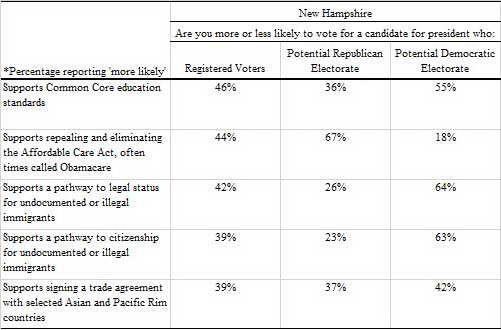July 26, 2015
7/26: IA: Walker, Trump Vie for Lead… NH: Trump Leads GOP…Sanders Closes Gap against Clinton
In the all-important first-in-the-nation caucus and primary states of Iowa and New Hampshire, three Republican hopefuls have moved away from the very crowded GOP field. In Iowa, Wisconsin Governor Scott Walker receives the support of nearly one in five members of the potential Republican electorate, 19%. Businessman Donald Trump follows closely behind with 17%, and former Florida Governor Jeb Bush, the only other candidate with double-digit support, is competitive with 12%.
In New Hampshire, Trump garners the support of more than one in five potential Republican primary voters, 21%, and bypasses Bush, 14%, and Walker, 12%. As in Iowa, no other Republican candidate receives double-digit support.
On the Democratic side, former Secretary of State Hillary Clinton remains the front-runner for her party’s nomination, but Senator Bernie Sanders of Vermont has cut into Clinton’s lead in both states. In Iowa, Clinton is ahead of Sanders, 55% to 26%, among the potential Democratic electorate. Although Clinton is solidly ahead of Sanders, she previously had a 61 point lead over him in last February’s NBC News/Marist Poll.
A similar pattern is seen in New Hampshire where Clinton is currently ahead of Sanders by 13 points, 47% to 34%, among the state’s potential Democratic electorate. Earlier this year, Clinton held a 56 point lead over Sanders.
If Joe Biden enters the race, Clinton loses support but still maintains a lead in Iowa and New Hampshire.
“With a vivid imagination, you can detect early signs of order to the GOP contest. Walker, Trump, and Bush occupy one of the top three positions in both Iowa and New Hampshire,” says Dr. Lee M. Miringoff, Director of The Marist College Institute for Public Opinion. “On the Democratic side, Clinton may be well advised to remember that objects in your mirror may be closer than they appear. Sanders has narrowed her lead in both early states.”
Poll points:
- Among potential Republican voters, Walker leads the GOP field among Tea Party identifiers in both Iowa and New Hampshire. Walker also leads among Iowa’s conservative and very conservative Republican voters.
- Trump leads among New Hampshire’s conservative and very conservative voters. But, his support among the potential Republican electorate dipped in New Hampshire from 26% to 14% following his comments about Senator John McCain.
- Among potential Democratic voters, there is a wide gender gap. Clinton leads Sanders by 47 points among women in Iowa and 25 points in New Hampshire. She leads Sanders by only 8 points among men in Iowa and trails him by 6 points in New Hampshire.
- Among liberal and very liberal Democratic voters, Clinton’s lead narrows to 10 points in Iowa compared with a 46 point lead among moderate Democrats. There is little difference in Clinton’s lead by voters’ ideology in New Hampshire.
- Sanders edges Clinton in Iowa among potential Democratic voters who are under 45 years of age.
Complete July 26, 2015 NBC News/Marist Poll Release of Iowa and New Hampshire
Complete July 26, 2015 NBC News/Marist Poll Tables of Iowa
Complete July 26, 2015 NBC News/Marist Poll Tables of New Hampshire
Favorably Speaking
Many of the Republicans vying for their party’s nomination are, generally, viewed favorably by the potential GOP electorates in Iowa and New Hampshire. However, there is one notable outlier. Trump is the best known but is also the least liked among these voters.
On the Democratic side, Clinton and Sanders are well-liked by their party’s potential voters in both states.
Poll points:
- In Iowa, at least, a majority of the potential GOP electorate has a favorable impression of Walker, Rubio, and Bush, with Walker receiving the highest positive score, 56%.
- Iowa’s potential Republican electorate divides over Trump who receives the highest negative score. 45% view him favorably while 44% perceive him unfavorably.
- In New Hampshire, Bush, 56%, receives the highest favorable rating among the potential Republican electorate. Walker, 51%, and Rubio, 49%, are also well-liked. Trump, however, garners a 53% negative score.
- Trump’s unfavorable rating among the potential Republican electorate in New Hampshire increased from 46% to 62% following his comments about Senator John McCain. There was little change in Iowa.
- Among the potential Democratic electorate in Iowa, Clinton enjoys a high favorable rating, 74%. A majority, 54%, also thinks highly of Sanders, but more than three in ten Democrats in the state either do not know him or are unsure how to rate him.
- In New Hampshire, many potential Democratic primary voters have positive opinions of, both, Clinton, 71%, and Sanders, 65%.
Presidents, Past and Present, Held in High Esteem by Their Party’s Faithful
Could former President Bill Clinton help or hurt his wife on the campaign trail? 83% of potential Democratic caucus-goers in Iowa have a favorable view of former President Bill Clinton. A similar 84% of the potential Democratic electorate in New Hampshire share this view. President Barack Obama’s favorable ratings among the potential Democratic electorates in Iowa and New Hampshire are 84% and 81%, respectively.
On the Republican side, 75% of the potential Republican electorate in Iowa has a positive opinion of former President George W. Bush. A similar proportion of potential voters in New Hampshire, 74%, thinks well of Bush 43.
Impact of Candidates’ Positions on the Vote
There is a consensus of opinion on issues in both Iowa and New Hampshire among the party faithful, but Democrats and Republicans are miles apart from each other.
Poll points:
- Nearly seven in ten members of the potential Republican electorates in Iowa and New Hampshire would be more likely to vote for a candidate who supports the repeal of the Affordable Care Act. They would be less inclined to support a candidate who favors Common Core, a pathway to legal status for undocumented immigrants, or a pathway to citizenship for undocumented immigrants.
- At least a majority of the potential Democratic electorates in Iowa and New Hampshire would be more likely to support a candidate who favors a pathway to citizenship for undocumented immigrants, a pathway to legal status for undocumented immigrants, or the Common Core curriculum. They would be less likely to support a candidate who would do away with the Affordable Care Act.
- Regardless of state or party, there is little consensus about how a candidate’s support of a trade agreement with select Asian and Pacific Rim countries would affect the vote.
Jobs and Economic Growth Key Campaign Issue
Adults in, both, Iowa and New Hampshire consider job creation and economic growth to be the priority in the 2016 presidential election.
Poll points:
- In Iowa, national security and terrorism, 45%, and the deficit and government spending, 42%, top the list of campaign issues for potential Republican caucus-goers. Among potential Democratic caucus-goers in the state, a majority, 53%, emphasizes job creation and economic growth.
- The New Hampshire potential Republican electorate considers national security and terrorism, 47%, and job creation and economic growth, 44%, to be of the utmost importance. Half of potential Democratic voters in New Hampshire, 50%, mention job creation and economic growth. Health care follows closely with 45%.
Voters Emphasize Positions on the Issues over Electability
The potential Republican and Democratic electorates in Iowa and New Hampshire believe it is more important that their respective party’s nominee is someone who shares their positions on the issues rather than someone who has the best chance of winning the White House.
Bush and Clinton Fatigue Present in Iowa and New Hampshire
More than six in ten Iowans, 61%, report it is time for someone with a last name other than “Bush” or “Clinton” to occupy the White House. A majority of New Hampshire residents, 56%, agree.
In each state, members of the potential Republican electorate are more likely than the potential Democratic electorate to think there should be an end to the Clinton and Bush political dynasties.
Poll points:
- 67% of Iowa’s potential Republican electorate, compared with 50% of the state’s potential Democratic electorate, say someone other than a Bush or Clinton should have a chance at winning the White House.
- In New Hampshire, 63% of potential Republicans voters would like to see an end to the Bush and Clinton dynasties. Members of the state’s potential Democratic electorate divide. 45% do not want another President Clinton or Bush while 46% are not opposed to the idea.
Ayotte Leads Hassan in U.S. Senate Race
The tides have turned in the U.S. Senate race in New Hampshire. Republican incumbent Kelly Ayotte is ahead of Democrat Maggie Hassan by 8 percentage points among registered voters statewide.
Poll points:
- 50% of New Hampshire registered voters support Ayotte while 42% favor Hassan. When NBC News/Marist last reported this question in February, Hassan, 48%, and Ayotte, 44%, were more competitive.
Approval Rating Roundup
President Obama’s job approval rating continues to be upside down in Iowa and New Hampshire. The governors in each state have experienced declines in their job approval ratings.
Poll points:
- 49% of Iowans disapprove of the job performance of President Obama while 43% approve. The president received identical scores when the NBC News/Marist Poll last reported this question in February.
- In New Hampshire, 52% of residents disapprove of how President Obama is doing his job. 41% approve. Earlier this year, 50% disapproved of the president’s job performance, and 43% approved.
- Among Iowans, Governor Terry Branstad’s job approval rating is at 50%, down from 64% in February.
- 56% of New Hampshire residents approve of the job Governor Maggie Hassan is doing in office. However, her rating is down from 68% previously.
Marist Poll Methodology for Iowa
Nature of the Sample and Complete Tables for Iowa
Marist Poll Methodology for New Hampshire
Nature of the Sample and Complete Tables for New Hampshire

